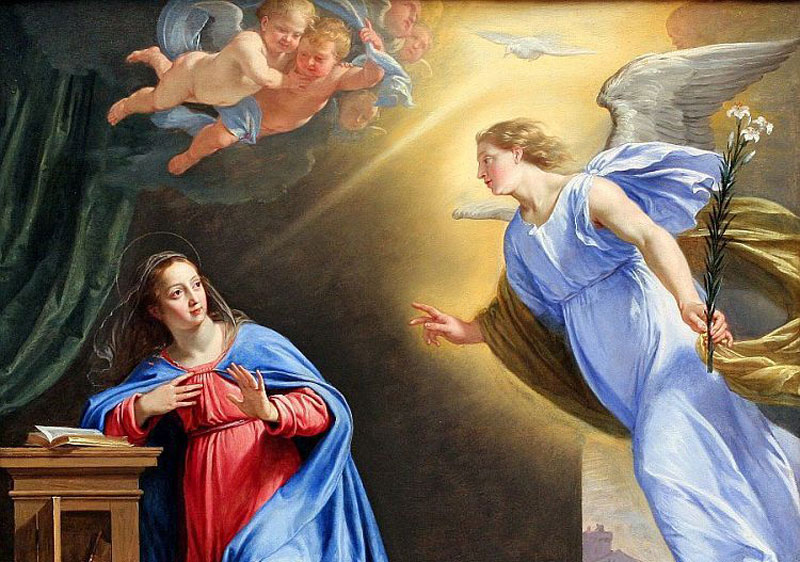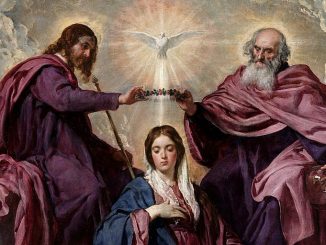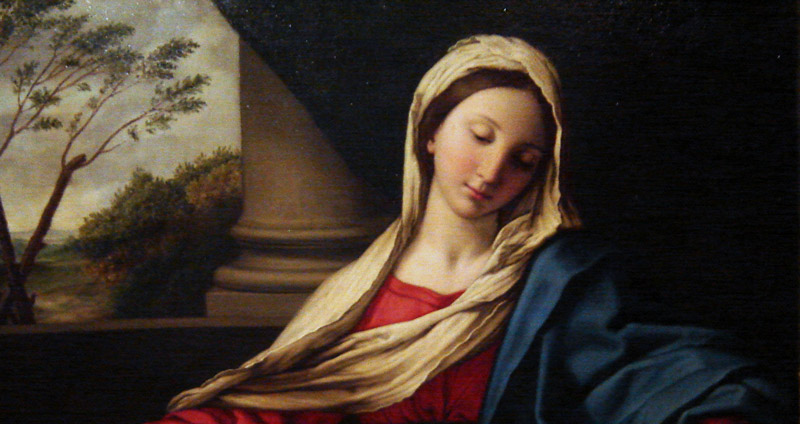
Today as we celebrate the Solemnity of the Immaculate Conception, I think back to the times when I was teaching both adults and young people, and I would ask them what the meaning of this Feast Day was before I would teach them. I was always amazed with the answers that they would come out with. Some confused the Immaculate Conception with the Annunciation. Some admittedly said, “Even though we have been celebrating it for years, we do not know what this Feast Day means.” Others said that somehow it had something to do with Mary – what, they did not know.
This Feast Day of the Immaculate Conception, as all doctrine that deals with Mary, is centered on her motherhood, on her as Mother of God. Very early on, the Fathers of the Church had a devotion to Mary because they understood that without Mary salvation would never have occurred. She is an essential part of the equation for salvation and for redemption that Jesus Christ has given to us. The Fathers of the Church reflected upon her motherhood and upon the words of today’s Gospel which we hear the angel proclaim when he greets Mary, “Hail full of grace! The Lord is with you.” As the Church meditated upon the words “full of grace”, what could they mean and what is the significance of the angel proclaiming Mary full of grace? Prior to the actual conception of Jesus Christ she is proclaimed “full of grace”. As the Church reflected on that, the Church realized through revelation and through faith, that Mary was conceived without sin, that her conception was immaculate.
That is what this feast day celebrates. It celebrates Mary’s unique role, her cooperation with God in the mystery of redemption, in the Word made flesh. It celebrates her uniqueness. She is unique, in that she is conceived without original sin. God preserved her through the redemption of Christ from the moment of her conception. Mary never committed a sin. Mary never experienced interior temptations. She was full of grace. We see her tremendous cooperation with our God. Even though humanly she does not fully understand how all of this is possible. Even the greeting, because of her conscience, disturbs her. We are told she was greatly troubled at what the angel said to her and pondered what sort of greeting this might be. Yet in the midst of it, she was fully cooperative. She was told that “You will conceive in your womb and bear a son, and you shall name him Jesus. He … will be called Son of the Most High.” She raises the question, for she is a virgin, “How can this be?” She is given the promise and the revelation of God. “The Holy Spirit will come upon you, and the power of the Most High will overshadow you. Therefore the child to be born will be called holy, the Son of God.”
One can imagine what ran through her mind. When she is told that the child she is to bear is the Son of God, she realizes she is the Mother of God. That revelation is given to her. She knows that in her humanness she is fully unworthy of that, but she trusts in God completely. She surrenders to Him in total obedience. “Behold I am the handmaid of the Lord. May it be done to me according to your word.” In those words of obedience she cooperates with God. At that moment she becomes Mother of God for she provides the human nature while God provides the divine nature. The two are made one within her womb in the divine person of Jesus Christ.
Mary always leads us to Christ. She is the one who shows us how to live lives of holiness. In the teaching of Vatican II the council fathers refer to Mary as the one who helps us to know how to live holiness. We are called to have true devotion to Mary. If we as Catholics are not devoted to Mary, we will not be devoted to Christ, for the two go hand in hand. They are related to one another.
Christ Himself gave Mary to us at the foot of the cross. “Behold your mother.” Those words were not just spoken to John at that moment in history. Those words are spoken to the Church. Those words are spoken to each and every baptized Christian, “Behold your mother.” We are told in the Gospel that from that moment John took her into his home. You and I are called to take Mary into the home of our hearts because true devotion to Mary always leads to Jesus Christ. Just as she was open, receptive and obedient, so too are we called to live the same. We are called to receptivity, to openness, and to humility to receive the Word of God, that the Word may be made flesh within our lives.
It is most appropriate that this Feast Day be celebrated during the Advent season in which we prepare for the coming of Christ. We celebrate His birth and we await His second coming. We celebrate this Feast Day recognizing that the incarnation, redemption, and salvation were made possible through Mary’s fiat, through her words, “May it be done to me according to your word.”
St. Paul in his letter to the Ephesians in the second reading reminds us of the holiness to which we are called, that we might exist for the praise of God’s glory. The whole purpose of our lives is to live and to exist for the praise and the glory of God. The way that we can do that best is through our intimacy with Mary and with Jesus. Mary shows us, through her obedience, through her trust in God, how to be holy. She is fully human. She is what God wants for every human person. His deepest desire is that we respond to His call.
As we continue with our celebration today, I encourage you, my brothers and sisters, to have true devotion to Mary. If there is any sense within you that says, “What do we need Mary for?” remember that without Mary we would not have Jesus Christ and remember that Mary has been given to you as your mother by Christ Himself.
My prayer for each one of us is that we may have true devotion to Mary and that in our devotion to Mary, she as a mother will lead us to her son, Jesus Christ, who is our brother. Mary’s deepest hunger for each and every one of us is to do the will of the Father, to know her Son, and to live in communion with Him. I pray that each one of us, through our devotion to Mary, may be able in our own weaknesses and in our own struggles, to speak the words of Mary and make them our words, “Behold I am the servant of the Lord. May it be done to me according to your word.”
Catholic News Agency, printed with permission from the Diocese of Fargo, By Bishop Samuel J. Aquila
Image: “The Annunciation”, depiction of the Virgin Mary and the angel Gabriel by Philippe de Champaigne, 1602-1674.



